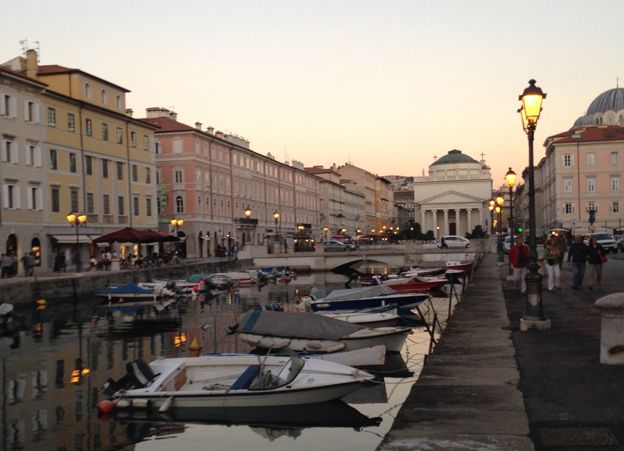Trieste: The Italian city that wants a divorce
- Published

In the aftermath of the Scottish referendum, independence movements across Europe are seeking their own media moments. And Italy - which only became a unified country in 1861 - has more independence movements than most.
The Venetian independence movement, spearheaded by businessman Gianluca Busato, made headlines recently with a non-binding online referendum in which Busato claims 87% of the population voted for independence.
Two hours east of Venice, near the Slovenian border, another city stakes its claim for independence.
Trieste has always had a culturally diverse history - for centuries, it was part of the Austro-Hungarian Empire; by the post-war years, it was Churchill's southern outpost of the "Iron Curtain" dividing the West from the communist East.
Immediately after World War Two, Trieste, on the border with Yugoslavia, was recognised as a free state under international law, though it remained under military occupation until 1954, when it was returned to Italy.
But for the members of the Free Territory of Trieste Movement, which has seen between 2,000 and 8,000 protesters at its rallies in recent months, Trieste's freedom has not ended.
In a dilapidated 19th-Century mansion, five minutes from the sea, Vito Potenza dreams of liberation.
Three red flags - sporting Trieste's traditional coat of arms - hang from the windows; another drapes the office tables.
The insignia is everywhere: on pins, on mugs, on Potenza's Facebook page.
"We are fighting for the rights of the people of the free Territory of Trieste," Potenza says. "We are fighting against the Italian government."
After all, they are under occupation.
Here, where the Venetian Spritz cocktail is served with Slovenian cheese on wheat bread, where seaside cafes offer their cappuccinos with a side of Viennese whipped cream, many identify as Triestine first, Italian second.
Once this city was the great port of the Austro-Hungarian Empire; in Piazza dell' Unita, three sides of the square are occupied by splendid Habsburg buildings; the fourth is sea.
A plaque commemorates the spot where Mussolini announced his policy of racial laws against the Jews. The Catholic Church of Saint Antonio shares space on the Grand Canal with the Serbian Orthodox Church; the synagogue is two minutes away.
"We are a multicultural people," Potenza says - he himself is half-Italian, half-Croatian.
His Free Territory of Trieste movement, which claims independence for the city and its hinterland, is designed to reflect that: he envisions Italian, Slovenian, and Croatian as joint official languages.
"Italy has kept our culture down for too long," he says. The fascist years of the 1920s and 30s, during which Trieste's Slavic population was subject to a programme of forced "Italianisation", are not so long ago.
Potenza and his supporters believe that Trieste is legally free under international law.
They cite a 1947 United Nations Security Council charter, which recognised Trieste and its surroundings - including parts of what is now Croatia and Slovenia - as a free state, with both Italian and Slovenian as official languages, subject to the appointment of an internationally recognised governor.
That "free territory", however, never existed in practice - during the seven years of Triestine independence, sections of "free territory" were governed by Britain, America, and Yugoslavia - until the London Memorandum of 1954, which returned the majority of the territory to Italy.
This decision, Potenza believes, amounts to unlawful invasion: "For 60 years, [Italy] has imposed sovereignty on our people... The treaty of 1947 is the law; it is the constitution of our territory."
His colleague, Giorgi Deskovich Deschi, fervently agrees.
Trieste is the "cold-weather Jerusalem", he insists.
"I am culturally Italian, but I keep within myself Croatian genes, Venetian genes, Slovak genes. This city can encompass all these characteristics in order to make itself a true centre."
He envisions a free Trieste as a "powerful symbol" for the future, where "all religions, all knowledge, all art" exist in unison.
"Trieste is truly open to the world," he says, using a masonic term, "agape", to describe his vision of togetherness. "We are living in a great moment, and Trieste is at the heart."
It is a Trieste where "Catholics, Serbian Orthodox, Jews, and freemasons" all live together.
Freemasons? Is he one?
He smiles cagily. "All religions and none," he says.
But Potenza's aims are economic as well as cultural.
Trieste has an internationally important port, Potenza points out - with plenty of import taxes he sees as owed to the Free Territory - but "the Italian government refuses to apply the law" and collects the money.
Why should the relatively prosperous Trieste "fall down with Italy?" which, as he sees it, is in inevitable decline.
What about the majority of people in Trieste, who are perfectly happy to be both Triestine and Italian? Potenza shrugs. They cannot deny the law: "This project is more important."
It's only a matter of time, he says. Over the past year, he has sent several letters and signed petitions to the United Nations, demanding recognition of Trieste's free status.
"We haven't heard back," he says.
Many locals in Trieste also seem unimpressed.
"They're crazy," said a patron at one of Trieste's newest bars, located in the heart of what was once the Jewish ghetto. "How can it ever work?"
Another man was more blunt: "The only government I trust is the Austro-Hungarian Empire."
Still, Potenza and Deschi are hopeful.
The Scottish referendum has opened the door for more independence movements worldwide. Still, Potenza cautions against comparing them too closely.
"The Scotland situation is not comparable. We are not looking for independence. We are already independent," he insists.
The rest of the world just has to notice.
How to listen to From Our Own Correspondent:
BBC Radio 4: Saturdays at 11:30
BBC World Service: Short editions Monday-Friday - see World Service programme schedule.